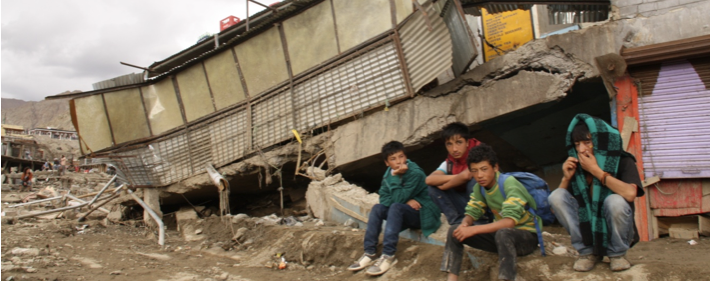
Disaster Strikes LFF's Operations, Leh
By Tamara Cannon
Founder, Lille Fro Foundation
On 6 August, the heavy monsoon rains which caused catastrophic flooding in Pakistan headed south over the mighty Karakoram Ranges into Ladakh, the Himalayan region of India where the Lille Fro Foundation works.
Just after midnight in the ancient capital of Leh, I was woken by the deafening roar of thunder which shook the ground. Lightning flashed into my room and the sky outside was electric. A gale force wind had picked up, bending the trees at right angle.
Leh’s stray dogs were ominously quiet and for a brief moment there was an eerie calm. Then the heavens opened up.
In just 15 minutes Ladakh was devastated by unprecedented flash floods and mudslides. By first light the region where Lille Fro is based was declared a disaster zone.
Ladakh is situated in a high altitude desert. Framed by the Karakoram, Ladakh and Himalayan ranges the region is one of the highest and driest inhabitable places on earth. It is breathtakingly beautiful. Now people here are suffering and need our help.
As the skies unleashed at altitude, the velocity of water unsettled boulders and collected layers of the mountain ranges which had formed over 45 million years.
A series of mudslides were triggered throughout the region which devastated everything in their path.
Leh, perched above 3,500 metres, was flattened in part. Buses and cars were tossed upside down, three storey buildings demolished, homes filled with mud.
Parents barely had time to grab their children and flee. Many were lost, including 12-year old Fatima Nissa, one of our sponsored girls, who was swept from her mother’s arms as they tried to escape.
On the heavily populated outskirts of Leh the destruction was even worse. Choglamsar and Sarbu were instantly flattened and many people were buried alive.
More than 500 are confirmed dead. Many are still missing and might never be found with hundreds of bodies carried downstream towards Pakistan by the fast moving Indus River. Locals believe the death toll will soon reach 1000.
Infrastructure is severely damaged. Roads and bridges have been destroyed; schools are buried under mud. Electricity and communications are being restored slowly, hampering relief efforts. The risk of disease from contaminated water is increasing.
Swaths of Ladakh have been ruined - however due to the isolation of the remote regions information is not forthcoming. It will take months before the true extent of the destruction is known.
-

What We Are Doing To Help
LFF is on the ground providing hands-on disaster relief and assistance where it is needed most. Since the mudslides hit, we have organised over 250 volunteers to dig mud and debris ...
OUR ACHIEVEMENTS TO DATE -

Disaster Relief Appeal
Our focus is to give priority support to children affected or orphaned by the disaster and to build more greenhouses in affected areas providing access to fresh food
FUND A GREENHOUSE -

How You Can Help
Urgent donations are needed to to help pay for emergency relief items and supply more water filtration units. Alternatively support a child long-term by becoming a sponsor.
DONATE OR SPONSOR A CHILD
The Lille Fro Foundation is dependent on the generosity and support of the Australian public to continue our work.

